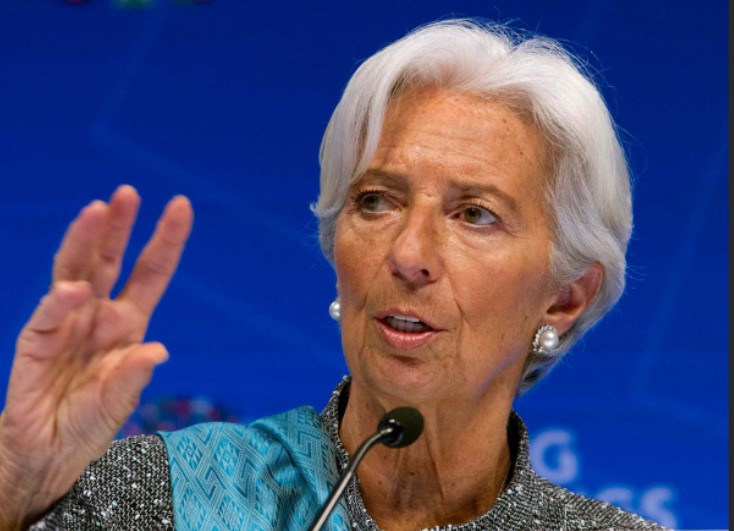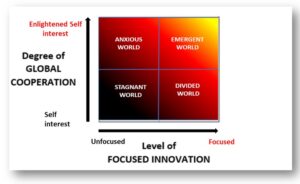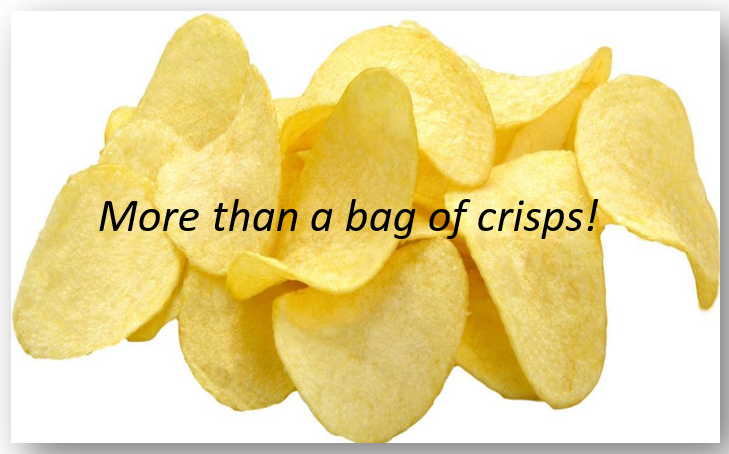‘Globalisation is dead’ . . . and so?
CONTEXT
I was listening to interviews of delegates attending the IMF Conference in Washington last week (Quest means Business, 20.45 CNN, 22/4/22) when, Christine Legarde – the sober-minded, Head of the European Central Bank – appeared and boldly stated that ‘Globalisation was dead’.
Of course, what Madame Legarde meant was that the current light touch version of globalisation was no longer viable and had to be replaced by something that fitted the new realpolitik, bought to a head by the recent actions of the RUSSO-Block. A few weeks earlier Olaf Sholtz, in an address to the German parliament, had made a similar outspoken statement, describing the RUSSO-blocks invasion of Ukraine as a ‘Zeitenwende’ – a moment of truth – referring to it in a subsequent interview as a ‘turning point’ in global affairs.
The term ‘turning point’ has particular resonance for the Segmented World Model that uses the changes in 26 global parameters to plot, every five years, the position of the world on a Matrix defined by the degree of Global Cooperation and the level of Focussed Innovation.
The GC-FI Matrix (the segmentedworld.com)
Five years, however, is a long time to wait for a result, so on the Segmented World website I have introduced this blog (The Segmented World Perspective) where I examine current major events that may influence parameter value and therefore the position of the world on the GC-FI Matrix.
Undoubtedly, the double whammy of a global pandemic followed by regional war (The ’early 2020 Pandemic-War Event’) will have a significant impact on the parameter scores both in the short (2025) and most probably long-term (up to 2050).
The starting point for analysing any such event, is to consider the likely impact on the three Global Drivers (Resource, Pollution and Population) that underpin the Segmented World Model (see Dialogues by typing real thesegmentedworld into your browser).
Here are some of my preliminary conclusions.
RESOURCE (Inanimate)
Fossil Energy (FE): Even before the Pandemic, there were clear signs that oil supplies, in particular, were failing (Tverberg 4/22; ourfiniteworld.com; ‘Something Happened’ the segmentedworld.com) due to a combination of green policy-driven underinvestment and, more worryingly, signs of irreversible shortages in key provinces.
Globally, there are two main, long-term sources of FE: the RUSSO-Block and the Middle East. By using its Fossil Energy resource (coupled with its nuclear arsenal) to deter a global response to its brutal military, action, the RUSSO-Block has exacerbated a number of negative global issues.
-
-
- FE price rises were already predicted to rise in 3-4 Q this year (Oil Price 18/1/22) due to underinvestment. The RUSSO-Block invasion has now consolidated that trend. FE prices will remain high (ca. $100/bbl+ WTI) for the foreseeable future as supply disruption and competition for non- sanctioned RUSSO-Block FE. This will increase global inflation and lower economic growth.
- A new global FE price differential may now develop, as discounted RUSSO-Block FE is sold, to the benefit, of Powerblocks and StaticLand States that have been non-critical of RUSSO-Block actions.
- In gas poor Powerblocks and States, coal usage will increase
- For Powerblocks and States sanctioning the RUSSO-Block, there will be new investment in politically safe oil and gas provinces.
- In FE-poor Powerblocks and States, irrespective of their level of RUSSO-Block support, an acceleration in the development of alternative, independent, forms of energy, will occur.
-
Fossil Metal and Minerals: The same is being repeated for the global supply of natural metals and minerals due to Pandemic disrupted supply lines but without a significant boost from the RUSSO-Block that has less leverage in non-FE commodities, at present.
POLLUTION
- GHG emissions will continue to rise up to 2025 at least, as countries sanctioning the RUSSO-Block are obliged to increase coal burning, as a substitute for natural gas.
- Net Zero does not equal New Fossil Energy. Recognition among governments that until non-polluting alternatives are widely available, energy transition plans must now incorporate Fossil Energy in order to guarantee energy security.
POPULATION
- Food Shortage (see Segmented World Perspective (22/03/09; the segmentedworld.com) The removal of the Ukrainian harvest to global food supply, for as long as the war continues, will lead to a significant increase in global food shortages eventually resulting in an uptick in the level of economic migrants.
Impact on the 26 parameters
The tentative economic, political and social impact of these conclusions on the 26 parameters is shown on the tracker table below.
The Segmented World Parameter Tracker (2025 only)
‘early 2020 Pandemic-War Event’ indicated world outcome
Not surprisingly, the ‘early 2020 Pandemic-War Event’ points towards a STAGNANT or DIVIDED WORLD outcome, but it is important to state that it is still too early to draw such a conclusion – even for 2025. A contrarian view, for example, could argue that the RUSSO-Block’s actions have served as a wake-up call – as Legarde’s assertion suggested; an overdue recognition that a new world order, requiring a new world attitude is upon us, that must be addressed by the civilised world if the horrors of the 1920-1940 interregnum are not to be repeated.
I would prefer, from a Segmented World Perspective, a broader statement: Living in the Time of Plenty is dead let’s get on with living in the Time of Less.
In the next blog, I will take this forward by examining how the ‘early 2020 Event’ may impact the future configuration and relationships of global geopolitics and the vital issue of Focussed Innovation.
David
26/4/22




